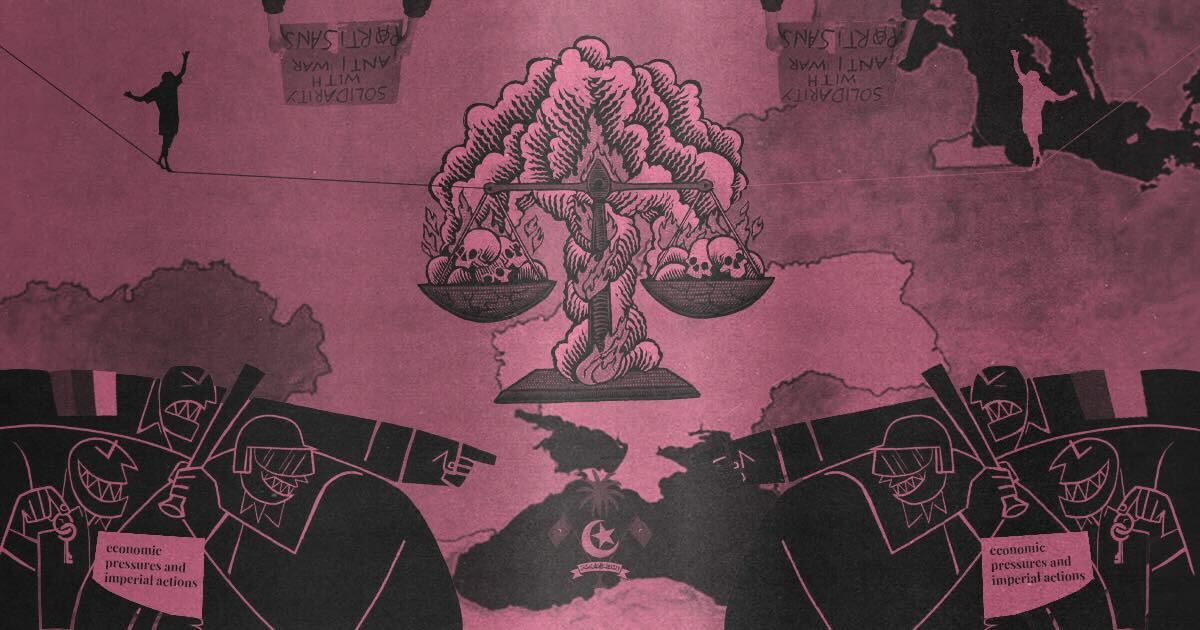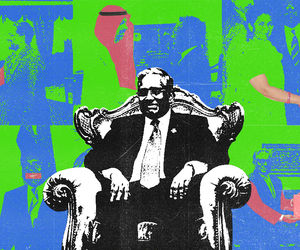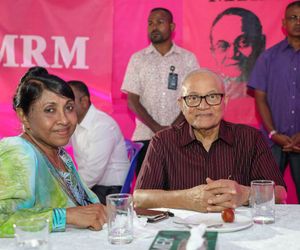Russian ambassador's clash with ex-Maldives presidents lays bare geopolitical tightrope
The Maldives faces a delicate balancing act between principles and pragmatism.

Artwork: Dosain
27 Mar 2025, 23:41
The Russian ambassador’s public scolding of two former Maldivian presidents revealed more than just diplomatic hyper-sensitivity – his sharp rebukes brought into even sharper relief the delicate balancing act between principles and pragmatism for a tourism-dependent country.
When former president Mohamed Nasheed expressed pride over the Maldives voting in favour of a UN resolution for a “comprehensive, just, and lasting peace in Ukraine” on February 24, Russian Ambassador Levan Dzhagaryan accused him of “following outdated European aggressive position and militaristic rhetoric.”
“I would like to remind Mr. Nasheed that it’s Russian tourists (not Ukrainians) who inflate the budget of Maldives during their stay on this marvellous archipelago,” the Russian envoy to the Maldives and Sri Lanka retorted, referring to Russia’s position as the second largest source of tourists to the Maldives with 225,204 holidaymakers and an 11 percent market share last year.
Nasheed promptly apologised. The tweet was “not in any way a position taken against Russia,” he insisted.
“We want to see peace, just as I’m sure you do. As you know, the Maldives is a small nation, and we do not want to be caught up in rapidly changing geopolitics,” he assured. “The position that the Maldives took is a position that the country always maintains, given that we are a small state.”
The apology appeared to placate the ambassador as the Russian embassy in Colombo assured that it would “respect every country regardless of its size”.
It was not the first such exchange. In August, former president Maumoon Abdul Gayoom questioned the lack of a UN reaction after Russian airstrikes in Ukraine, prompting a denunciation of the “unacceptable tweet” from Ambassador Dzhagaryan, who defended the “special military operation” and advised the octogenarian statesman to “refrain from following the policy of double standards traditionally pursued by the collective West.”
Sovereign calculations
In the wake of the ambassador’s more recent flare-up in February, Gayoom’s son Faris Maumoon criticised the present Maldivian foreign policy as lacking foresight and a clear vision.
“It would be much wiser for the Maldives to assert its diplomatic maturity and adopt a clear, strategic geopolitical stance, unflinchingly prioritising our national interest,” the former lawmaker advised. “In a world of shifting alliances and global complexities, our stance must reflect visionary leadership, calculated pragmatism, and an unwavering focus on safeguarding our national interests.”
Dr Ahmed Shaheed, who served as foreign minister under both Gayoom and Nasheed, concurred that foreign policy should be based “first and foremost on the country’s abiding national interests,” which are determined both by fixed national characteristics and “systemic attributes beyond our control” such as international norms and relations and great power rivalry.
“Therefore, it should not surprise anyone that a country does not change its voting stance across administrations especially on issues of high international interest,” he told the Maldives Independent.
Since Russia invaded Ukraine in February 2022, the Maldives’ stance has been the same under both the former and current governments, backing UN resolutions calling for the withdrawal of troops.
Condemning military incursions across recognised boundaries while maintaining economic ties with the aggressor might appear contradictory. But it might be sensible from a small state's perspective, suggested Azim Zahir, a lecturer at Curtin University's Centre for Human Rights Education.
"The Maldives UN voting record shows that the principle that underpins it is sovereignty and territorial integrity. It might seem strange or paradoxical because, at the same time there is a need to limit economic damage," he told the Maldives Independent.
Dr Shaheed, who previously served as a UN special rapporteur, noted that each UN vote is unique even when the same resolution is taken up years later.
“It is important to be principled but that does not rule out being pragmatic – never provoke a state that can inflict damage on you. What is more important than being principled is being transparent and being able to justify one’s position,” he suggested.
“A pragmatic stance grounded in national economic interest would often be acceptable and credible. Moreover, does Maldives have to take a side on every UN vote or even take part in every UN vote? I do not think it is necessary for Maldives to pronounce a position on every issue under the sun, unless it is about a direct interest of the Maldives.”
Strategic neutrality
After gaining independence in 1965, the Maldives pursued a non-aligned policy under president Ibrahim Nasir. At the height of the Cold War in 1976, when the British vacated its Royal Air Force base in Addu, the Soviet Union proposed US$ 1 million to lease the base. A foreign exchange-starved Maldivian government deliberated for months, before turning down the proposal.
Support for the sovereignty and independence of small states was consistent with the old non-aligned policy, which was followed by nations who avoided joining the rival blocs led by the US and USSR, Dr Shaheed explained.
While the core elements of the policy have changed since the 1950s, “it does not call for neutrality in the face of foreign intervention or violation of the sovereignty of a state,” he noted.
Gayoom, who succeeded Nasir in 1978, continued with non-alignment. But the Azhar-educated scholar strengthened diplomatic relations with Arab nations.
When India responded to his pleas and foiled an armed coup attempt in November 1988, “Gayoom realised the importance of multilateralism for security, particularly from external threats,” Azim suggested.
“This led to a change in foreign policy. As a whole a non-aligned policy was still practiced, but at the same time attempts were made to develop deeper and closer bilateral ties with US and India, particularly when it comes to security."
The democratically-elected leaders who followed Gayoom after the first multi-party election in 2008 maintained support for the rules-based international system.
"You can say that deviated maybe slightly between 2013 to 2018 when [former president Abdulla] Yameen, facing serious scrutiny over human rights issues from the west, decided to look east, and develop stronger ties with China and also Saudi Arabia. But not by much," a senior Maldivian diplomat told the Maldives Independent.
Uncertain horizons
Many scholars argue that the post-1945 rules-based international order established by the US – which has also been criticised, mainly by thinkers from the global south, as biased towards western hegemony – protected small states like the Maldives from the invasions and annexations that characterised most of human history.
“The UN charter system, under-written by the United States, and mobilised by the Third World movement for decolonisation, has been very beneficial to small states, embedding the principles of sovereign equality of states and non-interference in the internal affairs of states,” observed Dr Shaheed.
“The Maldives owes its independence as a sovereign state to Amin Didi’s foresight in securing the 1948 agreement and Ibrahim Nasir’s timely application to become a UN member state in 1965. Without these timely moves we may have had a very different history,” he continued, listing the benefits provided by international law such as the demarcation of borders, protection of maritime zones, and claims to a continental shelf.
“Similarly, it is this system that offered the Maldives the opportunity to trigger the recognition of a human right to a safe and healthy environment.”
But the passing of the unipolar world with the US as the undisputed superpower might spell uncertainty for the Maldives.
"The broader global context, within which smaller states like Maldives is trying to navigate, is going through a major transition," Azim explained.
“Some argue that we are entering into a multipolar world order or a bipolar system. I think we have the US and then we are seeing the rise of China. The kind of geopolitical power transition that we are seeing right now, I would say, is very much the US and China rivalry. So it's within that context that I think the Maldives is trying to navigate at the moment."
Dr Shaheed expressed concern over the implications for small states.
“When such a system collapses, what could emerge in its place is one where rules and norms do not matter. Where rules are weak, balances of power would matter; but even then, small states would be disadvantaged. Where there is no balance of power, a sphere of influence with a regional hegemon would emerge and maintain order on its terms,” he observed.
“In the short run, what is more likely is more disorder and chaos created by opportunism and mismanagement rather than a changing of the guard. What would this mean for small states? Engage in a lot of quiet diplomacy with as many relevant actors as possible and without stepping on the toes of neighbours and big powers.”
Discussion
No comments yet. Be the first to share your thoughts!
No comments yet. Be the first to join the conversation!
Join the Conversation
Sign in to share your thoughts under an alias and take part in the discussion. Independent journalism thrives on open, respectful debate — your voice matters.




